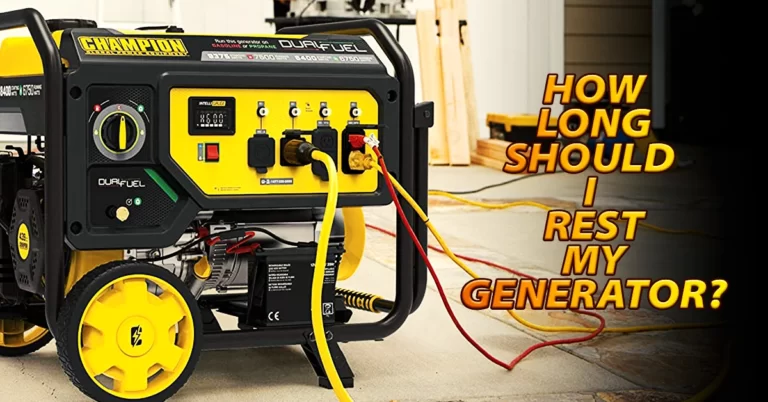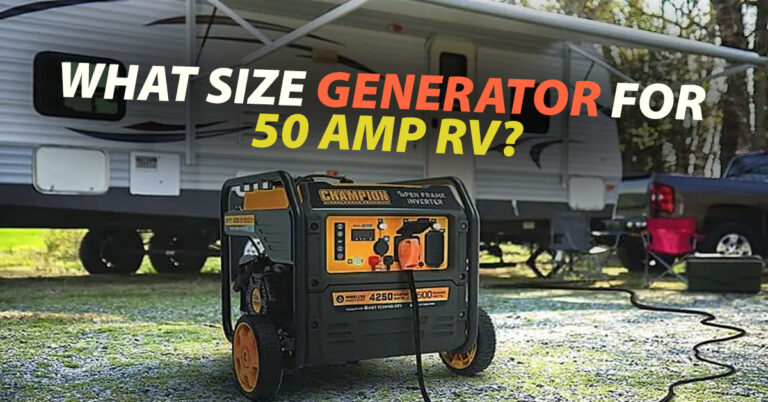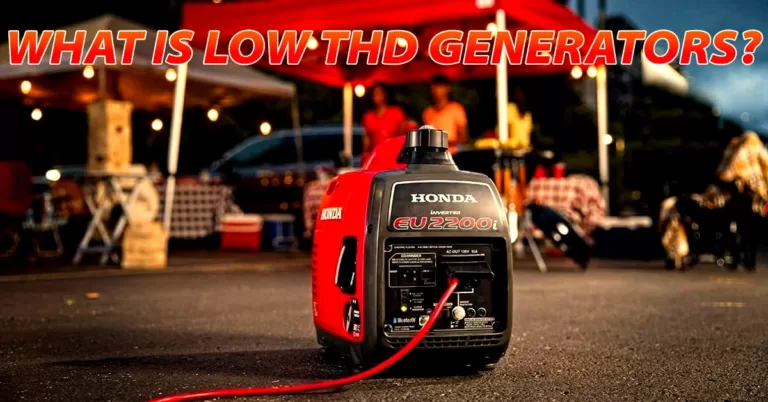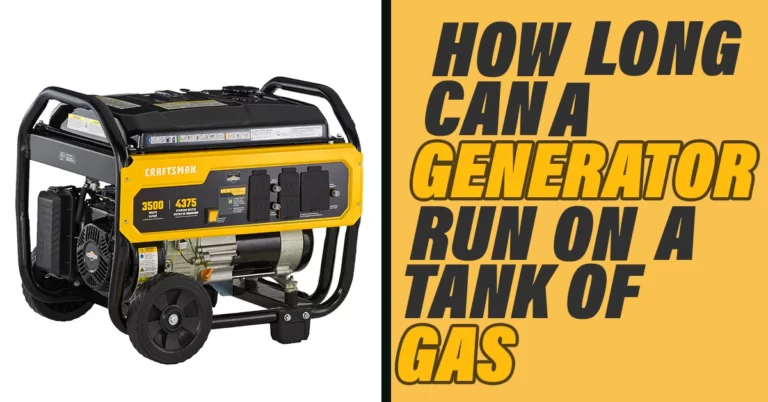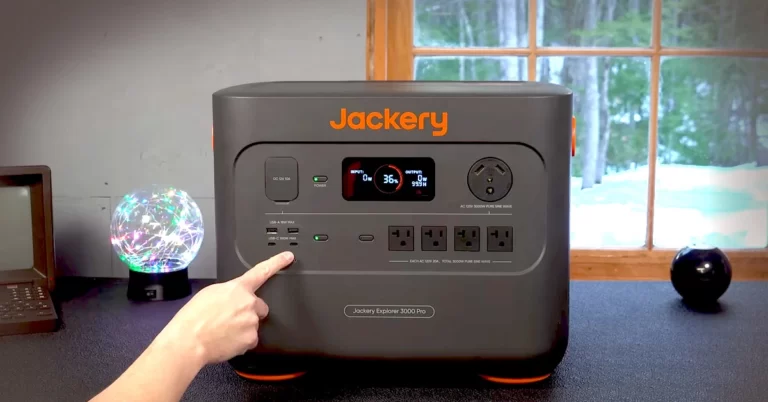how Does Solar Generators Work
In today’s world, where sustainability and eco-friendliness have become crucial concerns, solar power has emerged as a viable alternative to traditional energy sources. With technological advancements, solar generators have gained popularity as reliable backup power sources for outdoor trips, camping, and emergencies.
This article aims to provide a basic understanding of how solar generators work, the components that make up a solar generator, their benefits, and their cost. Whether you are an avid outdoor enthusiast, a prepper, or someone looking for a backup power source for emergencies, understanding the basics of solar generators can help you decide whether to invest in one. So let’s dive in and explore the world of solar generators.
What is a solar generator?
A solar generator is a backup power system that uses renewable energy from the sun to generate electricity. It typically consists of one or more solar panels that convert sunlight into DC power, which is then stored in a battery for later use. The stored energy can power small appliances, electronics, and other devices, making solar generators ideal for outdoor activities, camping, and emergencies.
Solar generators can also be used in remote locations where grid power is unavailable, and they provide a clean and sustainable energy source free from harmful emissions. Additionally, they are portable and easy to use, making them a popular choice for outdoor enthusiasts and people who want to reduce their carbon footprint. Overall, a solar generator is an efficient and eco-friendly alternative to traditional backup power sources. Here is a useful article called “How To Choose The Best Solar Generator For Your RV.”
How Does Solar GeneratorS Work?
Solar generators are becoming an increasingly popular source of power, especially for those looking to go off-grid or have a backup power source in case of emergencies. But how do they work?
Solar generators comprise several components that produce usable electrical energy from the sun. Let’s take a closer look at each of these components:
Solar Panels
The solar panels are the heart of the solar generator. They capture the sun’s energy and convert it into electricity. The panels comprise photovoltaic (PV) cells that convert sunlight into direct current (DC) electricity. The number of solar energy panels generated is determined by size and number.
Battery
The battery is where the energy generated by the solar panels is stored. The battery stores the excess energy generated during the day to be used at night or during cloudy days. Most solar generators use lithium-ion batteries, which are lightweight and have a long lifespan. Some older models may still use lead-acid batteries, which are heavier and less efficient.
Charge Controller
The charge controller is a device that regulates the flow of energy from the solar panels to the battery. It prevents overcharging and undercharging, which can damage the battery. The charge controller also optimizes the charging process to ensure the battery is charged as efficiently as possible.
Inverter
The inverter converts the DC electricity stored in the battery into AC (alternating current) electricity that can be used to power household appliances. Most appliances require AC power, so the inverter is a crucial component of the solar generator. The inverter also regulates the voltage and frequency of the AC power to ensure that it is stable and safe for appliances.
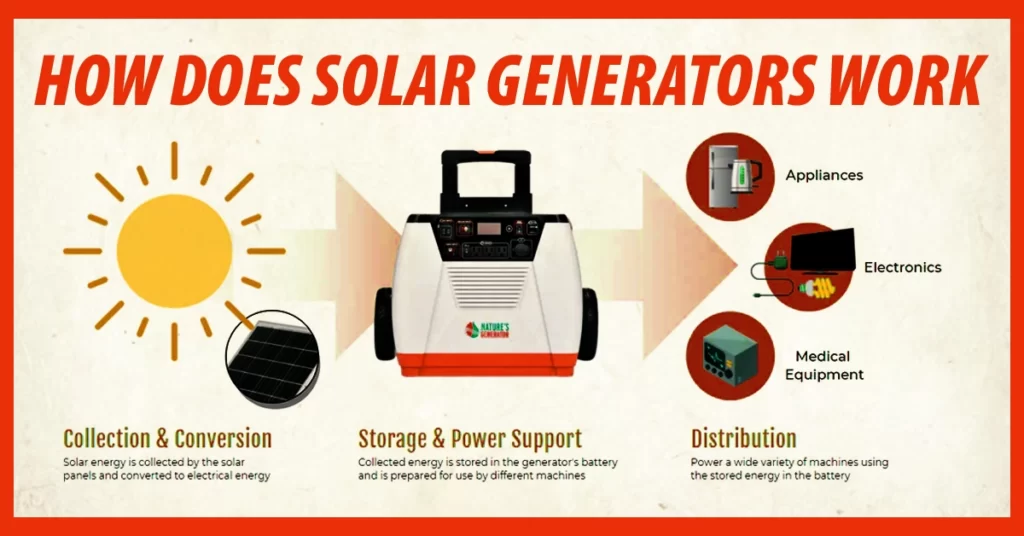
Why Are Solar Generators Essential?
In today’s world, having access to power is more critical than ever. Many people rely on electricity to stay connected, communicate, and survive. In a power outage, it is crucial to have backup power at home; solar generators are an increasingly popular option.
Essential Backup Power For Critical Medical Devices
Power outages can be life-threatening for people who rely on medical devices to manage their health at home. CPAP machines, oxygen concentrators, and other medical devices require a reliable power source. Solar generators provide a dependable backup power source that can help save lives.
Power For Home Appliances
Solar generators are also helpful for powering smaller appliances like fans, medium-sized refrigerators, and air conditioners. During a power outage, having these appliances powered by a solar generator can help keep you comfortable and safe.
Eco-Friendly and Cost-Effective
Using solar generators to power your home is an eco-friendly solution that can save you money over time. Once you invest in a solar generator, you can generate free, clean energy from the sun. In locations where power outages are common, this is especially advantageous.
Portability And Convenience
One of the most significant benefits of solar generators is their portability and convenience. Unlike traditional gas-powered generators, solar generators are noise-free, require no fuel, and easily move around.
Safer And More Reliable In Emergencies
Finally, solar generators are safer and more reliable in emergencies than gas-powered generators. Gas-powered generators emit harmful fumes and can pose a fire hazard, while solar generators are clean, quiet, and pose no danger to your family’s health.
Solar Generators vs. Gas generators
Regarding power generation, there are two main options: gas generators and solar generators. While gas generators have been around for a long time, solar generators are becoming increasingly popular due to their eco-friendliness and convenience. In this article, we will compare solar and gas generators and highlight the advantages and disadvantages of each.
Pollution And Noise
Gas generators emit pollutants like carbon monoxide, harming the environment and human health. They also produce a lot of noise, which can be a nuisance in residential areas. Solar generators, on the other hand, are eco-friendly and noise-free, making them an excellent choice for those who are conscious of their environmental impact and value peace.
Reliability
Gas generators rely on fuel, which can take a lot of work to come by during an emergency. If there is a natural disaster or a power outage, it may be difficult to access a fuel source, making gas generators useless. Solar generators can provide power as long as there is sunlight, making them a reliable option during emergencies.
Portability
Gas generators are heavy and bulky, making them difficult to transport. They also require a lot of maintenance and fuel storage. Solar generators, on the other hand, are lightweight and portable, making them ideal for outdoor activities like camping or hiking.
Cost
Gas generators can be expensive to run, requiring fuel and maintenance. They also have a shorter lifespan compared to solar generators. While solar generators may have a higher upfront cost, they are more cost-effective in the long run, as they require no fuel or maintenance and have a longer lifespan.
Costs Of A Solar Generator
The cost of a solar generator depends on various factors, such as the brand and specifications. In general, the larger the power capacity of the generator, the higher the price. The main components of a solar generator are the charge controller, inverter, and solar battery. Among these, the battery is the most expensive component.
Interestingly, lithium, often associated with batteries, makes up only a tiny portion of the battery. The most expensive lithium battery component is cobalt, which acts as the negative cathode of the battery. Cobalt is a scarce metal and is mainly mined as a byproduct of other metal mining operations, making it difficult to obtain and driving up the cost of the battery.
Solar generators are available in various power capacities, from smaller models that can power small appliances to larger models that can power a whole house.
It is important to note that while the upfront cost of a solar generator may seem high, it can provide long-term savings in terms of reduced electricity bills and lower maintenance costs compared to traditional gas generators.
Benefits Of Using A Solar Generator
Free, clean Energy From The Sun
When you use a solar generator, you essentially use free energy from the sun instead of using costly and dirty fossil fuels. You can continue getting this free energy from the sun for the lifespan of your solar panels, which is usually around 25 to 30 years.
Low Maintenance Costs
Unlike most conventional fuel or gas generators, solar generators have no moving parts and do not use liquid fuel. No moving parts mean that the likelihood you will need to pay for any repairs is significantly lower.
Quiet And Clean Operation
Aside from the noticeable financial gains of using a solar generator, choosing this green technology over other fossil fuel systems has various environmental upsides. Gas-powered generators lead to air pollution alongside noise pollution, and while the latter is annoying, the former contributes to climate change.
Investment Opportunity
The overall lifespan of a solar panel is 25 to 30 years. While gas-powered generators have long lifespans, usually 20 to 40 years, they do not come without problems. You must perform various maintenance jobs on them to keep them operational. Additionally, you will need to buy them fuel to run the device continuously. Solar-powered generators require no such tasks.
Light And Easy
Most heavy-duty gas-powered generators can weigh hefty amounts, sometimes up to 250 pounds. The less powerful the generator, the lighter it usually weighs, but in summary, solar generators weigh much less than gas-powered generators.
Versatile Usage
Solar generators are not just limited to outdoor activities like camping or RVing. They can also be used as backup power for your home during power outages or emergencies. They can power essential appliances like refrigerators, fans, and lights, making them a reliable and convenient source of electricity.
Zero Emissions
One of the most significant advantages of using a solar generator is that it produces zero emissions. As a result, it does not emit harmful pollutants or contribute to greenhouse gas emissions, two of the main factors contributing to air pollution and climate change. Using a solar generator, you do your part to protect the environment and reduce your carbon footprint.
Portability And Convenience
Many solar generators are built with portability in mind. They are designed to be compact and lightweight, making them easy to transport from one location to another. Some models come with built-in handles, while others may include wheels or even backpacks for easy carrying. Because of this, solar generators are practical and easy to use during outdoor activities like camping or in isolated areas.
Safer And More Reliable In Emergencies.
Power outages are common during hurricanes, tornadoes, and earthquakes. Solar generators can be safer and more reliable in such scenarios than gas generators. Solar generators do not emit toxic fumes, making them safer indoors or in enclosed spaces. They also do not require a constant supply of fuel, which can be difficult to access during emergencies. With a solar generator, you can be sure to have access to clean, reliable energy when you need it most.
Disadvantages Of A Solar Generator
Solar generators have gained popularity in recent years as a clean, renewable energy source. However, as with any technology, there are some disadvantages to consider before purchasing.
Temperature Sensitivity
Some solar generators are sensitive to high temperatures. As a result, they might not work effectively or sustain damage in highly hot environments. It is important to check the temperature sensitivity of a model before purchasing, especially if you live in a hot climate.
High Installation Cost
While solar generators do not require much maintenance or running costs, the initial installation cost can be quite high. The size of the generator will also affect the price. However, this is a one-time cost, and the benefits of free energy from the sun often outweigh the initial investment.
Climate Dependence
Solar-powered generators work best in tropical and subtropical climates with plenty of sunlight. Solar generators may be less effective in areas with less sunlight or more frequent cloudy weather. It is crucial to assess the weather patterns in your area before investing in a solar generator.
limited Power Capacity
Most portable solar generators have limited power capacity, so they may not be suitable for powering larger appliances or devices. It is essential to check the wattage capacity of a generator before making a purchase.
Slow Recharge Time
Solar generators rely on the sun to charge their batteries. It indicates that recharge times may be lengthy, particularly on gloomy days. It is essential to plan accordingly and have backup power sources in case of extended periods of low sunlight.
Types Of Solar Generators
Solar generators are a clean and reliable energy source that can provide backup power or be used as a portable source of electricity. There are two main types of solar generators: solar backup generators and portable solar generators. We will explore the differences between the two and help you determine which is right for you.
Solar Backup Generators
Solar backup generators are designed to provide backup power for your home in case of a power outage. These generators are permanently installed and wired to your home’s electrical panel, so they turn on automatically when the power goes out. They are an excellent investment if you live in an area with frequent power outages or rely heavily on electricity for medical equipment.
One of the main benefits of a solar backup generator is that it provides uninterrupted power for as long as the sun is shining. As long as the sun is out, the generator will continue to produce electricity. These generators are typically more prominent and have a higher power capacity than portable solar generators.
However, solar backup generators are expensive and require professional installation. They are also less portable than portable solar generators and unsuitable for outdoor activities like camping or tailgating.
Portable Solar Generators
Portable solar generators are small, self-contained units that can be easily transported and used in various settings. They have built-in batteries that store solar energy when no sunlight is available. These generators are ideal for camping trips and outdoor events, or as a backup power source for small appliances.
One of the main benefits of portable solar generators is their portability. They are lightweight and easy to transport, making them perfect for outdoor activities. They are also easy to set up and use. All you need to do is place the solar panels in the sun and connect them to the generator.
However, portable solar generators have a lower power capacity than solar backup generators, which rely heavily on sunlight. If the weather is cloudy or there is limited sunlight, the generator battery may be unable to charge fully. Portable solar generators are also not ideal for long-term backup power as they have limited battery capacity.
Solar Backup (Standby) Generators
Solar backup generators are permanently installed and wired to your home’s electrical panel. They turn on automatically when the power goes out and provide backup power for as long as the sun shines. Here are some of their features:
- They have a high wattage capacity and are valuable during a power outage.
- They can power televisions, fridges, bulbs, fans, and other appliances.
FAQs
In The Event Of Outdoor Activities, How Do You Charge Portable generators?
You can charge solar-powered rechargeable batteries using power sources other than solar PV panels. Most portable solar generators come with several charging cables, such as an AC plug, a carport charging cable, USB outputs, a solar panel cable, etc. They can often be powered through a conventional wall outlet as well.
Are Portable Solar Generators Worth Owning For Home Use, And Where Will You Use The Generator?
A portable solar generator is an excellent investment for home use. It can provide enough power to operate small electrical tools in off-grid situations, emergency responses, and off-road trips. However, the power produced by a solar generator is regulated by the quantity and capacity of solar panels. You can only provide a restricted number of solar panels in the accessible space on the rooftop or in your recreational vehicle (RV). The energy is only sometimes sufficient to power everything you need frequently.
In conclusion, depending on your energy needs and intended use, you can choose either a solar backup generator or a portable solar generator to meet your power needs.



